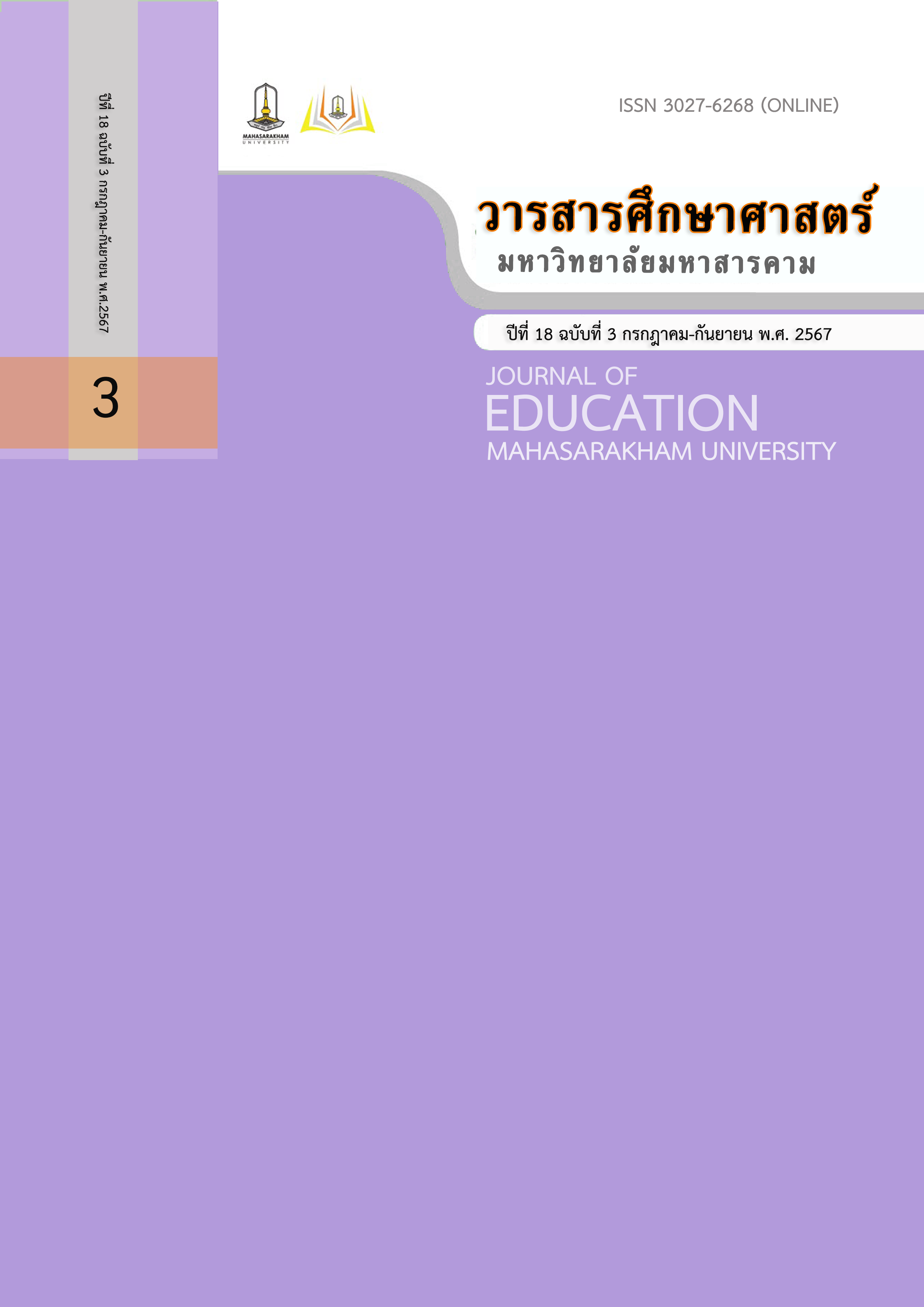The Development of Learning Activities by Role Playing on Rules and Thai Etiquette for the Second Grade of Primary School
Main Article Content
Abstract
This research aims to 1) develop role play learning activities on the topic of ‘Rules and Thai Etiquette’ to be effective according to the criteria of 80/80, 2) compare the learning outcomes between before and after participating in the role play learning activities for the second grade of primary school students, 3) compare the analytical thinking abilities before and after the learning activities, and 4) study the satisfaction of the second grade of primary school students towards the role play learning activities. The sample group in this research consists of 14 students in the second grade of primary school from Ban Nong Teun School, selected through cluster sampling technique. The research tools include 1) the plans for role play learning activities, 2) a test measuring learning outcomes, 3) a test measuring analytical thinking abilities, and 4) a satisfaction questionnaire. The statistical analysis involves percentages, averages, standard deviations, and t-test for dependent samples.
The research findings are as follows: 1) the learning activities using role playing learning on ‘Rules and Thai Etiquette’ for the second grade of primary school students are effective, with an efficiency rating of 85.40/83.21, 2) the achievement scores of the students significantly increase after participating in the activities compared to before, at the significance level of .05, 3) students demonstrate the improvement of analytical thinking abilities after the activities at the significance level of .05, and 4) students satisfy with the role play learning activities, at the highest level of excellence overall.
Downloads
Article Details

This work is licensed under a Creative Commons Attribution-NonCommercial-NoDerivatives 4.0 International License.
References
กระทรวงศึกษาธิการ. (2551). หลักสูตรแกนกลางการศึกษาขั้นพื้นฐาน พุทธศักราช 2551. กรุงเทพฯ : โรงพิมพ์ชุมนุมสหกรณ์การเกษตรแห่งประเทศไทย.
ชวษา ปิยะนฤพัทธ. (2561). การศึกษาผลการเรียนรู้ และความพึงพอใจต่อการจัดกิจกรรมการ เรียนรู้แบบบทบาทสมมติ เรื่อง เศรษฐศาสตร์ในชีวิตประจำวันของนักเรียนชั้น ประถมศึกษาปีที่ 2. วิทยานิพนธ์ปริญญาศึกษาศาสตรมหาบัณฑิต, มหาวิทยาลัยศิลปากร, นครปฐม.
ดวงณภัทร เสาแก้ว. (2563). ผลการจัดการเรียนรู้ เรื่อง มารยาทไทยของนักเรียนประถมศึกษาปีที่ 2 โดยใช้การจัดการเรียนรู้แบบแสดงบทบาทสมมติ. วารสารคณะครุศาสตร์ มหาวิทยาลัยราชภัฏนครสวรรค์, 3(1), 57.
ทิศนา แขมมณี. (2564). ศาสตร์การสอน : องค์ความรู้เพื่อการจัดการกระบวนการเรียนรู้ที่มีประสิทธิภาพ. (พิมพ์ครั้งที่ 25). กรุงเทพฯ : โรงพิมพ์แห่งจุฬาลงกรณ์มหาวิทยาลัย.
บุญชม ศรีสะอาด. (2556). การวิจัยเบื้องต้น (พิมพ์ครั้งที่ 8). กรุงเทพฯ : สุวีริยาสาสน.
พันทิพา เวียงเพิ่ม. (2562). การพัฒนากิจกรรมการเรียนรู้แบบบทบาทสมติเรื่อง เศรษฐศาสตร์เบื้องต้นชั้น ประถมศึกษาปีที่ 6. วิทยานิพนธ์ปริญญาการศึกษาศาสตรมหาบัณฑิต, มหาวิทยาลัยมหาสารคาม, มหาสารคาม.
มัญชสุ เลานอก. (2565). การจัดการเรียนรู้โดยใช้ปัญหาเป็นฐาน วิชาสังคมศึกษาเพื่อส่งเสริม ความสามารถในการคิดวิเคราะห์ของนักเรียนชั้นประถมศึกษาปีที่ 5. วิทยานิพนธ์ปริญญาการศึกษามหาบัณฑิต, มหาวิทยาลัยมหาสารคาม, มหาสารคาม.
รวิวรรณ ศรีคร้ามครัน. (2543). เทคนิคการสอน. กรุงเทพฯ : คณะศึกษาศาสตร์ มหาวิทยาลัยรามคำแหง.
โรงเรียนบ้านหนองตื่น. (2564). รายงานการประเมิน ตนเอง SAR โรงเรียนบ้านหนองตื่น ปีการศึกษา 2564. มหาสารคาม : โรงเรียนบ้านหนองตื่น.
อรัญ ซุยกระเดื่อง. (2557). การวิจัยทางการศึกษา. มหาสารคาม : ตักสิลาการพิมพ์.


